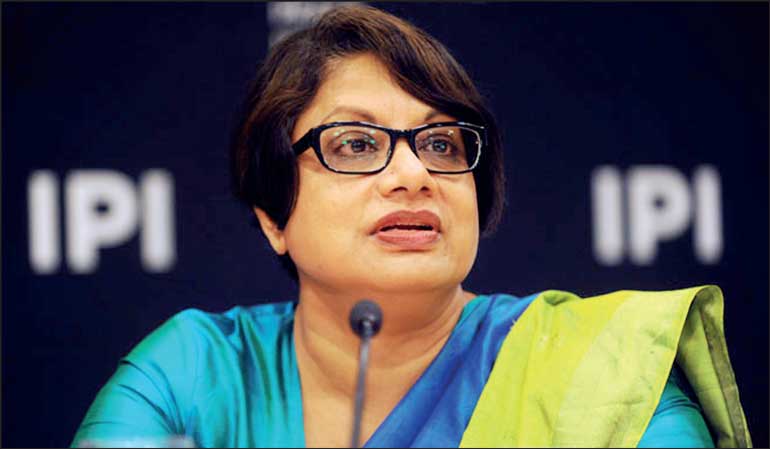Tuesday Feb 17, 2026
Tuesday Feb 17, 2026
Friday, 14 January 2022 00:00 - - {{hitsCtrl.values.hits}}

South Asians for Human Rights Chairperson Dr. Radhika Coomaraswamy
South Asians for Human Rights (SAHR), a regional network of human rights defenders, in a statement said it is deeply alarmed and concerned by the rising explicit intolerance against minorities especially Muslims, and the ongoing crackdown on human rights organisations in India.
Following is the full statement issued on behalf of the members of South Asians for Human Rights by its Chairperson Dr. Radhika Coomaraswamy:
In recent times India’s vibrant democracy has been seeing an alarming process of dilution by the rise of xenophobic nationalism and threats to religious minorities who are being pushed steadily and deliberately into becoming second-class citizens in their own country. The Hindutva ideology appears to have completely infiltrated politics and state governance resulting in the disintegration of the rule of law and public institutions such as the law enforcement machinery leading to relentless online and offline violence against minorities.
Recent incidents of the Bulli Bai App and Dharma Sansad at Haridwar indicate the undisguised visceral hatred unleashed openly and jointly by known political figures, sections of Hindutva ideologists, and the supporting public.
Online images of more than 100 prominent Indian Muslim women, including artists, journalists, activists, and lawyers, were used without permission and auctioned on the “Bulli Bai App” on 1 January 2022. In June 2021 a similar app, called “Sulli Deals,” appeared and was later taken down after complaints from victims. These incidents of anti-Muslim misogyny raise concern over the organised nature of virtual bullying and threats of sexual violence to silence the women who voice against injustice.
Further, the hate speeches made against Muslims at the Dharma Sansad at Haridwar is unnerving to any law-abiding citizen. Such vitriolic speeches instigating communal disharmony and caste-based violence are totally repugnant to the idea and image of India and is damaging its reputation as the world’s largest democracy. The levels of impunity that perpetrators enjoy is especially noteworthy.
Simultaneously the Indian authorities seem to be on a focused warpath to shut down critical voices and groups working to promote, protect and uphold fundamental rights. Its relentless allegations of violating laws on foreign funding and financial irregularities seem nothing other than the attempt to silence human rights activists, journalists, and other critics of the government. On 27 December 2021, the government blocked several organisations from receiving international donations. Jamia Millia Islamia University, Indian Medical Association, the missionaries of Charity, and the Nehru Memorial Museum and Library are among 5,879 entities whose Foreign Contribution (Regulation) Act (FCRA) registration certificates are deemed to have ceased.
The strength, sagacity, and maturity of a democracy is measured by a government’s ability to engage with dissenting voices and opinions and in being able to address the legitimate concerns raised by human rights defenders and civil society organisations. The implementation of the rule of law, the protection of human rights, guaranteed individual freedoms – of expression, assembly, and religious practice and freedom from discrimination are after all the hallmarks of a thriving, throbbing democracy.
SAHR strongly urges the government of India to reflect on its constitutional obligations, revisit its duties and responsibilities towards the welfare of all citizens of the country and ensure the protection and promotion of democratic values for all.